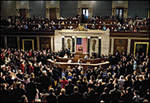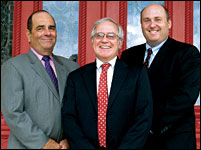Reflecting on Issues Close to Congress
Three Wilson Center directors visited St. Edwards University in Austin to discuss political, economic, and environmental issues currently being debated in the U.S. Congress.

Three Woodrow Wilson Center directors traveled to Austin, Texas on October 17 to discuss political, economic, and environmental issues currently being debated in the U.S. Congress. They spent two days at St. Edwards University, a private liberal arts school, giving presentations and guest lecturing in numerous classes.
"This trip was a prime example of the Wilson Center building a presence in a new city and reaching out to the next generation of American leaders," said Kent Hughes, director of the Program on Science, Technology, America and the Global Economy. "It also demonstrates how program directors and Wilson Center fellows collaborate on highly dynamic pursuits."
This visit of the three Wilson Center experts was the brainchild of Margaret Crahan, a former Wilson Center fellow who is a senior fellow at the university's Kozmetsky Center for Excellence in Global Finance. Crahan remains closely connected to the Wilson Center's Latin American Program.
 Hughes, along with Congress Project Director Don Wolfensberger and Environmental Change and Security Program Director Geoff Dabelko, said their presentations sparked lively discussions about the future direction of the country as well as the specifics of, and prospects for, action on key bills before Congress.
Hughes, along with Congress Project Director Don Wolfensberger and Environmental Change and Security Program Director Geoff Dabelko, said their presentations sparked lively discussions about the future direction of the country as well as the specifics of, and prospects for, action on key bills before Congress.
At an evening session held in the university auditorium, attended by more than 200 faculty and students, the discussion focused on Congress and moved on to such issues as Iraq, the presidential election, and energy independence. Earlier that day, during a lunch session attended by key university figures and supporters as well as notables from Austin, Helena Escalante, director of Texas Border and Mexican Affairs in the office of the Texas secretary of state, presented the three Wilson Center directors with certificates, signed by the governor and secretary of state, making them honorary Texans.
Update on Congress
Don Wolfensberger spent part of the time as a guest lecturer in an "American Dilemmas" class as well as at a leadership seminar. At the evening session, he said the new, Democrat-controlled 110th Congress has had mixed success during its first year, enacting three of its top six agenda items in the "six for '06" package of "New Directions for America" in the first nine months: increasing the federal minimum wage; lowering interest rates on student loans, and implementing the remaining recommendations of the 9/11 Commission. Congress also enacted tough new limits and reporting requirements on lobbyists.
Still languishing, however, are energy tax subsidy repeals, tied up in the larger energy bill, and legislation to enable Medicare to negotiate lower drug prices with pharmaceutical companies. The sixth item on the agenda, easing restrictions on federal funding for embryonic stem cell research, was vetoed by President Bush.
The big disappointments, said Wolfensberger, have been the Democrats' inability to change strategy on the Iraq war or keep their pledge in the House to be more fair and open with the minority party. "Their policy agenda trumped procedural fairness," he said. Moreover, the Democratic majority was unable to send any of the 12 regular appropriations bills to the president's desk by the October 1 start of the fiscal year. Wolfensberger predicted, "Legislating will become more difficult and confrontational as we move into the presidential election year."
America in the Global Economy
Kent Hughes addressed trade, international finance, and long-term economic competitiveness. He said the prospects for bilateral free trade agreements with Panama, Peru, Colombia, and South Korea have improved, with Panama and Peru likely to be the first in line. The Colombian agreements are on hold due to labor disputes, while the United States and South Korea continue to negotiate over access for American beef and cars. Nevertheless, Hughes predicted the Senate would approve all four agreements by the end of the current Congress.
Regarding finance, Hughes said the United States faces record trade and current account deficits. The central banks of Asia and major oil producers are now sitting on piles of U.S. dollars and other hard currency reserves. So far, the dollar has declined gradually, but the International Monetary Fund has warned that a collapse in the dollar could trigger a serious recession. The declining dollar has led holders of dollars to shift from bonds to the acquisition of productive assets such as commercial real estate.
In terms of long-term competitiveness, Hughes said key private and public bodies have produced reports calling for action on education and research. A bipartisan congressional request for recommendations on these issues led to Rising Above the Gathering Storm, a report of the National Academies. This report, combined with private sector support and continued congressional action, led to the president's 2006 State of the Union announcement that he would double the research budget of three key agencies over the next decade and create incentives for increased study and improved teaching of math and science. The American Competitiveness Act has made recommendations and promises law. The next step is to appropriate the money.
Environmental Politics
The public debate on climate change in the United States is fundamentally different today than it was just a year ago. Growing interest from the faith-based community, the private sector, military leaders, and states and localities is changing the dynamics of the congressional debate on climate change, said Geoff Dabelko at St. Edward's University.
Climate change has become a frequently discussed issue on Capitol Hill, and the presence of Democratic majorities in both houses of Congress makes climate change legislation a more likely prospect, said Dabelko. But a Democratic majority does not guarantee positive moves on all environmental fronts. For instance, according to Dabelko, the House's version of the 2007 Farm Bill includes a raft of negative environmental impacts.
During the past year, Congress has taken steps to reassert a prominent U.S. leadership role on climate change and other environmental issues, he said. For instance, a high-profile congressional delegation—perhaps led by Speaker of the House Nancy Pelosi—will attend the UN climate talks in Bali in December.
In addition, Congress has been pushing the Bush administration to use U.S. foreign assistance to raise the profile of less prominent environmental issues such as water and sanitation. Here, as with climate change, civil society groups such as Rotary International and faith-based groups such as Living Water International have pressured Congress to help developing nations increase access to potable water and to enforce existing legislation that prioritizes these issues, such as the Senator Paul Simon Water for the Poor Act of 2005. Water and sanitation issues mark a notable area of bipartisan consensus, in contrast to the typically politicized atmosphere surrounding other environmental issues.
Dabelko said there are dual motivations for U.S. action on environmental issues. The primary reason to act is the importance of the environmental issues themselves, but one must also consider the price the United States has paid in other diplomatic arenas for its lack of leadership on environmental challenges. Dabelko believes re-engagement on important environmental issues could advance other U.S. strategic interests.
Earlier that day, Dabelko lectured in several classes, including two presentations to natural science students on the Wilson Center's work on global health, and Hughes spoke to a "Living, Learning, Community" class geared toward freshmen. Following a visit full of lectures and discussions about current issues before Congress, the three newly honorary Texans left with a better understanding of the concerns of the next generation and the satisfaction of bringing Wilson Center expertise to a new audience.
Related Links
Related Program

Environmental Change and Security Program
The Environmental Change and Security Program (ECSP) explores the connections between environmental change, health, and population dynamics and their links to conflict, human insecurity, and foreign policy. Read more